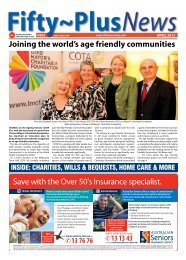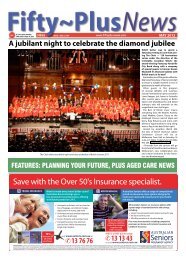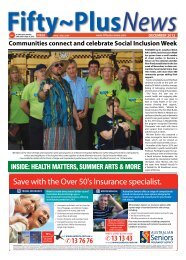September 2013 - Fifty-Plus News
September 2013 - Fifty-Plus News
September 2013 - Fifty-Plus News
You also want an ePaper? Increase the reach of your titles
YUMPU automatically turns print PDFs into web optimized ePapers that Google loves.
4 <strong>Fifty</strong>~<strong>Plus</strong> <strong>News</strong> <strong>News</strong><br />
<strong>September</strong> <strong>2013</strong> <strong>September</strong> <strong>2013</strong><br />
<strong>News</strong><br />
<strong>Fifty</strong>~<strong>Plus</strong> <strong>News</strong> 5<br />
Why should we<br />
care about<br />
older people<br />
and their rights? Are<br />
the rights of older<br />
people being ignored?<br />
Are they different from<br />
other groups? And do<br />
older people really<br />
matter anyway?<br />
All good juicy points for<br />
discussion! And these<br />
are the discussions countries<br />
had at the United<br />
Nations Open Ended<br />
Working Group (OEWG)<br />
on Strengthening the<br />
Rights of Older People<br />
at its fourth meeting<br />
in New York between<br />
12 – 15 August, with<br />
a number of panels of<br />
experts presenting on<br />
the gaps and issues in<br />
protecting the rights of<br />
older people.<br />
By including Berry Street in<br />
your Will, you will be planting<br />
a seed of hope and helping<br />
children and families recover<br />
from the trauma of family<br />
violence, neglect and abuse.<br />
Rights and older people<br />
Why is ageism not as abhorrent as sex or race discrimination?<br />
I attended the meetings<br />
as CEO of COTA<br />
Victoria and COTA<br />
Australia International<br />
Ambassador. Australia<br />
was well represented<br />
by civil society<br />
organisations with Bill<br />
Mitchell and Kim<br />
Boettcher, both lawyers<br />
representing the<br />
National Association<br />
of Community Legal<br />
Centres, as well as<br />
Telmo Languiller, a<br />
Victorian MP.<br />
To date the discussions<br />
have been about<br />
the existing frameworks<br />
and how they<br />
do or do not protect<br />
the rights of older<br />
people. The key existing<br />
framework is the<br />
Madrid International<br />
Plan of Action on<br />
Ageing (MIPAA) 2002.<br />
This aspirational document<br />
is a terrific guiding<br />
framework for<br />
policies and programs,<br />
and to date over 150<br />
countries have signed<br />
up to it.<br />
During the three previous<br />
meetings of the<br />
Working Group, the<br />
discussions from countries<br />
have ranged at<br />
one end from stating<br />
that the Madrid Action<br />
Plan is adequate and<br />
that the rights of<br />
older people are well<br />
upheld in this existing<br />
framework to the<br />
other extreme which<br />
hold that the Madrid<br />
Action Plan cannot<br />
protect the rights of<br />
older people as it is<br />
not a legally binding<br />
For more information contact the Community Relations Team<br />
on 03 9429 9266 or visit www.berrystreet.org.au<br />
instrument. Others<br />
have been more neutral<br />
with some stating<br />
that even if one was<br />
needed it could not<br />
be supported, as many<br />
countries are in financial<br />
crisis and could<br />
not support the agreement<br />
nor report to it.<br />
At the 10 year mark<br />
of the Madrid Action<br />
Plan, the framework<br />
was reviewed by the<br />
UN, and countries were<br />
asked to report back<br />
on the work they had<br />
been undertaking and<br />
the state of the world<br />
of ageing. There were<br />
23 responses in total.<br />
The reasons for such<br />
a low response could<br />
be many, but some<br />
would suggest it is<br />
not a framework many<br />
countries are actually<br />
engaging in and therefore<br />
an even greater<br />
reason for a convention<br />
to be sought.<br />
One question put to<br />
the working group was<br />
about the cost of not<br />
introducing a convention<br />
and not providing<br />
a vehicle to more<br />
strongly uphold the<br />
rights of older people<br />
around the world?<br />
Susan Ryan, Australia’s<br />
Age Discrimination<br />
Commissioner, in her<br />
latest report, Fact or<br />
Fiction, quotes statistics<br />
from a Deloitte’s<br />
study that if we could<br />
achieve a five per cent<br />
increase in the employment<br />
of older people<br />
it would return a $48<br />
billion contribution to<br />
the economy.<br />
While age discrimination<br />
continues so<br />
unchecked, we will<br />
struggle to achieve this<br />
economic and socially<br />
important outcome.<br />
In reflecting on the<br />
discussions from two<br />
years ago, I believe<br />
there have been some<br />
interesting developments<br />
that point in<br />
a positive direction<br />
towards a convention.<br />
The African Union has<br />
signed an agreement<br />
for the region which<br />
brings 54 African<br />
countries into the<br />
position of supporting<br />
a convention, which<br />
joins up with the Latin<br />
American group. The<br />
America’s group of<br />
countries are working<br />
on an agreement for<br />
October.<br />
Comment<br />
with Sue Hendy, CEO, COTA Victoria<br />
The EU is not supporting<br />
a convention<br />
and neither is America<br />
nor Canada. Australia<br />
is rather neutral, but<br />
informally outside the<br />
UN has said it is open<br />
to the idea.<br />
An important factor<br />
lacking in these discussions<br />
is the voices<br />
of older people in<br />
the member states<br />
(countries) across the<br />
globe and COTA, working<br />
in partnership<br />
with the International<br />
Federation on Ageing,<br />
will be working to<br />
increase the voices<br />
from older people in<br />
Australia to our government.<br />
To this end<br />
we will be holding a<br />
forum in Sydney in<br />
late November, bringing<br />
all the relevant<br />
groups representing<br />
older people and<br />
NGOs together with<br />
human rights groups,<br />
to develop a plan of<br />
Call for new deal for<br />
older Australians<br />
Ahead of the forthcoming<br />
federal election, COTA<br />
Australia recruited a panel<br />
of nearly 900 people over 50<br />
years of age to identify the<br />
issues that were important<br />
to them for this election and<br />
into the future. The panel<br />
commented on a wide range<br />
of issues and their voices<br />
inform COTA Australia’s call<br />
for an overarching national<br />
action plan that presents a<br />
vision to reshape Australia<br />
to ensure a better deal for<br />
older Australians.<br />
The New Deal, which forms<br />
COTA’s Federal Election<br />
Platform, brings together<br />
expert advice and the views<br />
of COTA supporters and<br />
election panel members<br />
in a national framework to<br />
address the challenges facing<br />
older people and bring about<br />
a new deal.<br />
To achieve this COTA Australia<br />
calls on government to:<br />
• Develop and deliver a<br />
five-year broad anti-ageism<br />
campaign.<br />
• Strengthen the Age<br />
Discrimination Act to ensure<br />
that it provides the same protectios<br />
as the other anti-discrimination<br />
Acts.<br />
• Support the development<br />
of a United Nations<br />
Convention on the Rights of<br />
Older Persons.<br />
The survey revealed that 85 per<br />
cent of panel members thought<br />
that Australia was not prepared<br />
for an ageing population and<br />
that the most important issue<br />
affecting older Australians was<br />
‘access to quality health services<br />
(72 per cent selected it in their<br />
top five issues). Panel responses<br />
to the survey highlighted other<br />
particular issues to be incorporated<br />
into the new deal for older<br />
people including: the participation<br />
of older Australians in the<br />
workforce as long as they want<br />
or need; access to quality aged<br />
care services when and where<br />
they are needed; ensuring that<br />
collaborative action.<br />
This will then feed<br />
into a regional gathering<br />
as a component<br />
of the 12th Global IFA<br />
conference on Ageing<br />
in Hyderabad, India in<br />
June 2014 before the<br />
next meeting at the<br />
UN of the Open Ended<br />
Working group in<br />
August 2014.<br />
COTA has played<br />
a leadership role in<br />
Australia and will<br />
continue to work for<br />
the rights of all older<br />
Australians. If you want<br />
to be involved, you<br />
can be part of raising<br />
awareness by letting<br />
your local federal MP<br />
know of your concern<br />
and telling them you<br />
want our government<br />
to support your<br />
rights by supporting<br />
a convention. You<br />
can also find more<br />
information at COTA<br />
VIC’s website: www.<br />
cotavic.org.au<br />
older Australians can have a reasonable<br />
standard of living; an<br />
end to ageism and age discrimination<br />
in all parts of Australian<br />
society. The full report on COTA<br />
Australia’s new deal details the<br />
ways that government can<br />
achieve these aims.<br />
“COTA Australia is calling<br />
for a new deal for older<br />
Australians that gives them<br />
fair and equitable engagement<br />
in the development and<br />
delivery of services and provides<br />
them the opportunity<br />
to continue to contribute to<br />
the community as they have<br />
done throughout their lives,”<br />
said Ian Yates, chief executive<br />
of COTA Australia.<br />
“A new deal is essential not<br />
only for the welfare of older<br />
Australians. It is essential if<br />
Australia is to take advantage<br />
of the opportunities that our<br />
changing demographics offer<br />
our community.”<br />
The full report is available at<br />
www.cota.org.au<br />
Three common misconceptions about aged care fees<br />
The maze that is the<br />
aged care system is<br />
extremely complex. The<br />
most important aspect of the<br />
process is to make sure your<br />
loved one makes a smooth<br />
transition into the most<br />
suitable accommodation. While<br />
assisting many clients find their<br />
way through the convoluted<br />
fee structures, I have found<br />
that most people have similar<br />
common misconceptions.<br />
Once the accommodation bond<br />
is paid, it won’t be returned<br />
The accommodation bond paid to<br />
an aged care facility can range from<br />
as little as $50,000 to the largest I’ve<br />
seen of $1.5 million. It is commonly<br />
thought that this is a non-refundable<br />
‘entry fee’ to go into aged care.<br />
In reality, however, it is more like<br />
an interest-free loan that is either<br />
returned to the resident when they<br />
exit the facility, or to the resident’s<br />
estate upon their passing.<br />
As long as the facility is<br />
Government regulated, the<br />
accommodation bond is<br />
guaranteed by the Government<br />
and must be used for the<br />
maintenance and development<br />
of the facilities.<br />
The ongoing fees are an<br />
unreasonable amount<br />
There are a number of fees that<br />
can apply on an ongoing basis<br />
in aged care, including the basic<br />
daily fee, income-tested fee, extra<br />
services fee and an accommodation<br />
charge (for high-level care).<br />
These can add up to a substantial<br />
amount and cash flow becomes<br />
an important factor that needs to<br />
be managed carefully.<br />
However, when one considers<br />
the services being provided by a<br />
facility, the fees have to be kept<br />
in perspective. A facility provides<br />
a whole host of services and benefits<br />
including personal accommodation<br />
(often a room with<br />
an ensuite), communal facilities,<br />
three main meals a day, 24-hour<br />
care by qualified carers and<br />
organised activities.<br />
So what are the costs? The most<br />
a resident can pay for the basic<br />
daily fee is $50.57 per day, which<br />
is actually not very much for the<br />
services provided. It equates to<br />
$18,458.05 per annum.<br />
If a resident has a high income<br />
(sometimes due to having significant<br />
assets) they might be asked<br />
to pay the income-tested fee. This<br />
can be up to an additional $70.74<br />
per day ($25,820.10 per annum),<br />
which is a lot of money. However,<br />
put into perspective, it is only<br />
charged to those who have high<br />
income and can therefore afford<br />
it. It is still very reasonable for the<br />
services being provided.<br />
The ongoing fees<br />
cannot be reduced<br />
The costs of aged care are based<br />
on standard rules set by the<br />
Government, with some having<br />
set formulas and others based on<br />
guidelines. There are two types of<br />
costs in particular, that can range<br />
dramatically.<br />
The first is the Accommodation<br />
Seniors are political game changers<br />
As Australia’s marathon<br />
election campaign drags<br />
to a close, I wonder if<br />
political leaders have bothered<br />
to stop and think just who<br />
the game-changers are. These<br />
people live in both marginal<br />
seats and safe ones and make<br />
up nearly half the voting population<br />
– 47 per cent to be exact.<br />
They are Australians aged over 50<br />
and their numbers are growing rapidly.<br />
National Seniors has long advocated<br />
for them to be treated to<br />
the same rights and respect as<br />
the rest of the community. And<br />
with that kind of political clout,<br />
political parties that ignore their<br />
issues and concerns will pay the<br />
price at the ballot box.<br />
Our boutique<br />
retirement<br />
village has it all!<br />
• Spacious 1 bedroom<br />
apartments & 2 bedroom units<br />
• State of the art security<br />
system & 24 hour emergency<br />
call service<br />
We launched our Seniors Vote<br />
<strong>2013</strong> election campaign on 15<br />
August, calling on the winners of<br />
the 7 <strong>September</strong> poll to provide<br />
more certainty in four key areas:<br />
the economy, living costs, health<br />
care and an end to stereotyping<br />
of older Australians and their<br />
exclusion on the basis of age.<br />
So, very briefly, here are some of<br />
the issues National Seniors would<br />
like to see addressed.<br />
• We want an end to the constant<br />
interference in the rules<br />
governing superannuation which<br />
has caused anxiety for too many<br />
people for too long.<br />
• We also call for the government<br />
to help educate and empower<br />
seniors with the knowledge they<br />
• Short walk to the railway<br />
station, shops, cafes or even<br />
The Glen Shopping Centre<br />
• Adjoining beautiful parklands<br />
Available Now<br />
spacious 1 BED APARTMENT<br />
• $250,000<br />
2 bed unit with<br />
brilliant floor plan<br />
• $490,000<br />
Grace Gardens Retirement Village<br />
1 Grace Street, Glen Waverley<br />
Ph 9562 5814 or Mobile 0412 337 243<br />
need to make good decisions for<br />
their financial futures.<br />
• Discrimination against older<br />
workers remains entrenched and<br />
so there needs to be more support<br />
for mature aged employment.<br />
• Those who have retired need<br />
certainty that current arrangements<br />
for bi annual pension<br />
adjustments will be retained.<br />
• National Seniors is also calling<br />
for a $10,000 increase in the income<br />
thresholds for the Commonwealth<br />
Seniors Health Card.<br />
• We also want Commonwealthfunded<br />
senior and pensioner supplements<br />
to reach the recipient in<br />
full and not be subject to income<br />
assessments for state and territory<br />
charges.<br />
Rediscover your<br />
Memories<br />
WITH VIDEO TRANSFERS<br />
TO DVD, BLU-RAY, WEB & TABLET<br />
Present this<br />
voucher to<br />
receive your<br />
10% Discount!<br />
AS ADVERTISED ON<br />
“don’t trust your memories to just anyone”<br />
Bond, which is agreed between<br />
the resident and the aged care<br />
provider. The Government allows<br />
an aged care facility to charge<br />
a maximum bond based on the<br />
assets of the resident. However,<br />
often the bond may be far below<br />
the maximum. The main thing<br />
to ensure is that the bond being<br />
charged is reasonable and not<br />
‘above par’ for that facility.<br />
The second fee that can be<br />
variable is the ‘income-tested<br />
fee’. It is a fee that is calculated<br />
based on the resident’s income<br />
as calculated by the Centrelink<br />
income test. It is important to<br />
know that whether one is entering<br />
care or already in care, there<br />
are clever financial strategies that<br />
can be implemented to reduce<br />
the income-tested fee. If you are<br />
paying an income-tested fee, it<br />
is important to speak with your<br />
financial adviser about strategies<br />
to try to reduce it.<br />
Clearly, there are many facets<br />
to the aged care system and it<br />
is certainly not a simple exercise<br />
• Oral health is another huge<br />
area of concern as too many<br />
seniors do not have access to<br />
adequate dental care. For that<br />
reason it should be included<br />
within Medicare.<br />
• And seniors who are blind<br />
or who are losing their vision,<br />
should not be put out of sight<br />
and out of mind by a government<br />
which fails to act. To do nothing<br />
for many such people would<br />
be to condemn them to a life of<br />
house-bound dependence, social<br />
isolation, depression and loneliness.<br />
National Seniors wants a<br />
vision health strategy focused on<br />
medical and ancillary services.<br />
• We want the removal of barriers<br />
to seniors downsizing their<br />
Managing<br />
Money<br />
with Thabojan Rasiah<br />
Private Client Adviser<br />
Shadforth Financial Group<br />
going through it. That’s why it<br />
is important to seek advice from<br />
experts that are there to help,<br />
including Centrelink Financial<br />
Information Services Officers,<br />
Aged Care Placement Agencies<br />
and your Financial Adviser.<br />
• Thabojan Rasiah is Private<br />
Client Adviser at Shadforth<br />
Financial Group. He works with<br />
renowned financial adviser and<br />
commentator Kevin Bailey. If you<br />
would like to clarify your position,<br />
get a second opinion or review<br />
opportunities available to you,<br />
they offer an obligation free<br />
private discussion. To arrange,<br />
contact Kevin or Thabojan,<br />
9649 2400 or send an email to<br />
fiftyplusnews@sfg.com.au<br />
Comment<br />
with Michael O’Neill,<br />
CEO, National Seniors Australia<br />
Are you young at heart?<br />
Want to be active?<br />
Want to maintain fitness?<br />
Want to defend yourself?<br />
homes, age-friendly housing and<br />
age-friendly cities.<br />
The list is extensive but it’s<br />
not about a pre-election cash<br />
grab. It’s about education,<br />
awareness and a reordering of<br />
priorities.<br />
We want to change some negative<br />
attitudes towards seniors –<br />
for good.<br />
Maybe that’s more than any<br />
politician can deliver, but at least<br />
they can make a start.<br />
Wht not try our masters class?<br />
Adults only Mondays at 10am.<br />
Come down to our Dojo/School<br />
which will take you on a journey<br />
of self discovery!<br />
Sensei Bruce Hyland<br />
3/44 Peninsula Blvd Seaford 9782 3000 or 0409 782 304








